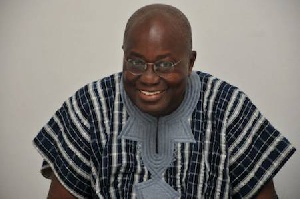 Nana Akufo-Addo, 2016 Flagbearer of the New Patriotic Party
Nana Akufo-Addo, 2016 Flagbearer of the New Patriotic Party
Nana Addo Dankwa Akufo-Addo has assured members and sympathisers of the New Patriotic Party, as well as the Ghanaian electorate, that the NPP is in good shape and ready for this year’s general elections.
Outlining a number of measures put in place to ensure that the party is ready to wrestle power from the Mahama government, the 2016 presidential candidate of the New Patriotic Party indicated that the party currently has in place “elected polling station, constituency and regional officers, working to ensure that we win the elections. The morale of these grassroots activists and volunteers is extremely high and spirited.”
With the Manhyia North and Kwesimintsim, the only two constituencies yet to have their parliamentary primaries, Nana Akufo-Addo indicated that “in the coming weeks, the process will be completed.”
Nonetheless, the party has constituted and inaugurated almost all constituency and regional campaign teams across the country, ensuring that the campaign will be a fully decentralised one, with the grassroots structures of the party, at the polling station, electoral area, constituency and regional levels in the forefront.
“Sector committees have been formed to help in the formulation and dissemination of policies and programmes in their respective areas, as well as contributing to putting together of the party’s Manifesto. We will present it in due course to the Ghanaian people, who are yearning for a change in their circumstances,” he added.
Nana Akufo-Addo made this known when he delivered an address at the E-lection Bridge Africa Conference, on Monday, May 16, 2016, an event organised by the Konrad Adenauer Foundation, at the Alisa Hotel, Accra. The event brought together experts from sub-Saharan Africa and Germany to build a bridge between players in modern political communication and provide a forum to share ideas, practices and successes.
Addressing participants at the conference, the NPP flagbearer stated that the party, as an opposition party, has been focusing on four main issues in the run-up to the elections. These issues are “advocating for electoral reforms to improve the chances of credible polls; putting the government on its toes in the interest of accountability within the parameters of a constructive opposition; and organising the party at the constituency level for an effective campaign and monitoring of the electoral process from registration, voting, to the declaration of results.”
Additionally, he indicated that “preaching our message of hope, and making an increasingly convincing case that, in us, there is a better alternative”, is still very much ongoing.
This message of hope, he noted, is hinged on the fact that “we have done it before, we have the leadership and a team of competent, committed and patriotic men and women; and we have a formidable programme to move our country forward to where it must be and can be and will be if the demand for change succeeds as it must.”
“That process has to go hand-in-hand with improving the productivity of our agriculture so that we can feed ourselves and diversify the cash crops we can export. The unfolding Ivorian example, of a neighbouring country with many of the same characteristics as our own, is a compelling one for us in Ghana. The current annual export value of Ivorian agriculture is US$12 billion; that of Ghana’s is US$2 billion,” he said.
“Our new status as a producer and exporter of petroleum offers us the perfect opportunity to create here in Ghana a petrochemical industry, including monetising our gas to create a multi-billion dollar gas feedstock industry. We have the opportunity to make Ghana a regional production and manufacturing centre, by weaving together our numerous natural resources, like food produce, extensive cash crops, gold, bauxite, iron ore, oil and gas, with our talents and energy to turn our nation into an economic powerhouse in West Africa and beyond.”